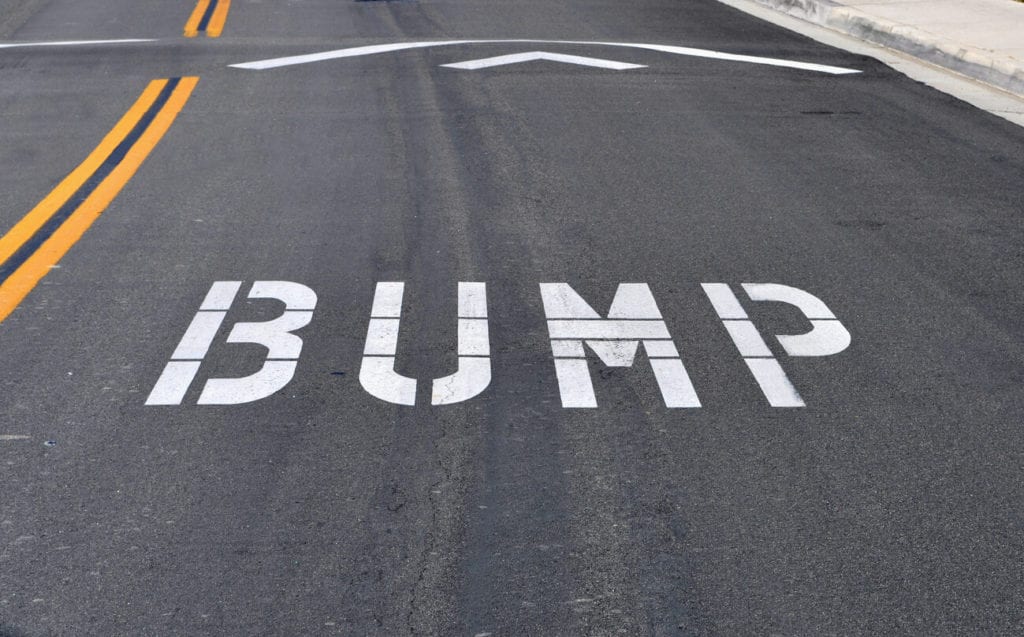 Speed bumps are great! Said no one, ever. Speed bumps are designed to slow drivers down and protect pedestrians from aggressive drivers. They’re made to slow vehicles on the road, neighborhoods, and parking lots and most often used in areas with speed limits of 35 MPH or less. Many drivers wonder what kind of damage speed bumps can cause to their cars. At Sun Auto Service, we often get asked if speed bumps are bad for your suspension and if wheel alignment cause slips after a speed bump. The answers really depend upon how you approach a speed bump. Drivers who zoom over speed bumps are likely to cause severe damage to their car. Consider this, when going over a bump at a high rate of speed, it’s equivalent to hitting every component in the car with a hammer. Ouch! Your car is designed to be tough enough to handle certain bumps and thumps, but the more intense and often they occur, the harder it is on those components and will eventually lead to costly repairs.
Speed bumps are great! Said no one, ever. Speed bumps are designed to slow drivers down and protect pedestrians from aggressive drivers. They’re made to slow vehicles on the road, neighborhoods, and parking lots and most often used in areas with speed limits of 35 MPH or less. Many drivers wonder what kind of damage speed bumps can cause to their cars. At Sun Auto Service, we often get asked if speed bumps are bad for your suspension and if wheel alignment cause slips after a speed bump. The answers really depend upon how you approach a speed bump. Drivers who zoom over speed bumps are likely to cause severe damage to their car. Consider this, when going over a bump at a high rate of speed, it’s equivalent to hitting every component in the car with a hammer. Ouch! Your car is designed to be tough enough to handle certain bumps and thumps, but the more intense and often they occur, the harder it is on those components and will eventually lead to costly repairs.
In some cases, poorly designed speed bumps can cause damage to vehicles, regardless of the speed the driver is traveling. If a vehicle moves over a speed bump without slowing, it can cause minor damage to the vehicle’s frame. Cars with low ground clearance should be driven over speed bumps carefully and sometimes at an angle to avoid serious damage.
Don’t make a habit of racing over speed bumps no matter the size of your vehicle. Here’s how speed bumps damage your car:
- They Damage Your Shocks – Cars absorb road imperfections with the use of shock absorbers, also known as shocks. This is why you don’t feel every bump, dip, or rock your car travels over. Shocks are regulators coils that react to changes you encounter on the road. A pothole, though, can make you jump because shocks are unable to absorb such a quick, unexpected dip in the road. The same could be said for speed bumps. When you travel too fast over a speed bump, your shocks are unable to absorb the energy that rapidly, which can cause damage like bending out of shape or leaking hydraulic fluid. If this happens often enough, the shocks can begin to break down and will be unable to protect your car. Without shocks, your tires can lose contact with the road during quick stops. If your vehicle goes airborne, you lose all control over your car.
- They Destroy Your Steering – When shocks are out of commission, the rest of your car pays the price. Constant vibrations from the road harm other vital systems within the car. Without the protection provided by your shocks, the steering components are severely shaken during the ride. Prolonged vibrations can cause leaks in the power steering system, throw your wheels out of alignment, and ruin steering rack mounts. All delicate components are vulnerable when driving too fast over a speed bump.
- They Wreck Your Exhaust System – Exhaust systems, set right underneath the car, are made to quiet vehicles as well as make them more efficient and environmentally friendly. Yet, going over a speed bump too fast can easily damage the exhaust system. If your car bounces off the road while going over a speed bump at a high rate of speed, chances are your exhaust system will hit the ground when you land, causing damage and hindering its ability to perform its intended tasks. The exhaust system uses rubber mounts to absorb bumps and vibrations with normal, day to day driving. When abused from poor driving, the mounts can be damaged and even break.
- They Ruin Your Tires – Only one part of your tire should come in contact with the road and it should not be the sidewalls. Sidewalls that touch the ground are at risk for blowouts as it accelerates wear. The impact of hitting the ground after soaring over a speed bump could drive the sides of the tires to the ground. Any damage to tires will require replacement, and a new set of tires can cost $500 or more.
Speed bumps are beneficial and help promote safe driving to protect nearby pedestrians from potential tragedies. When traveled over properly, speed bumps can be relatively harmless to your vehicle.
How can you avoid causing damage to your shocks, steering, exhaust system and tires from speed bumps? The answer is simple. Go slow. Going over a speed bump at about 3 MPH is very easy on your car. It allows the springs and shocks to compress gently so that they can absorb the bump, and properly decompress. You can prevent the annoying squeaks and vibrations in your car from loose, and potentially lost parts, as a result of excessive speeding over speed bumps, just by slowing down.
